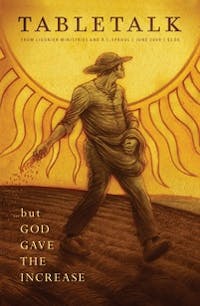
Request your free, three-month trial to Tabletalk magazine. You’ll receive the print issue monthly and gain immediate digital access to decades of archives. This trial is risk-free. No credit card required.
Try Tabletalk NowAlready receive Tabletalk magazine every month?
Verify your email address to gain unlimited access.
Might there be a time when readers of the Bible will not understand—without a host of reference books—what a sower is? For most of the world’s history, the majority of people made their living from the land. Today the number of family farms is dwindling. Farms have turned into factories. Tractors pulling seeders and tilling machines have replaced the figure of the sower who throws out seed from a bag. But whatever their agricultural techniques, we cannot do without farmers. Perhaps more clearly than any other profession, farmers exemplify the Reformation doctrine of vocation.
Every time we thank God for the food we are about to eat, we are confessing the doctrine of vocation. God gives us each day our daily bread. He does so through the vocation of the farmer who grew the grain as well as all of the other vocations who turned the grain into flour, then into bread, and eventually bring it to our table.
According to Luther, vocation is all about how God providentially works through human beings: bringing children into existence through the vocations of fathers and mothers; protecting us through the vocations of government, including judges, magistrates, and soldiers; proclaiming Christ through the vocations of pastors and others in the church who, like the sower, disseminate His Word. God grants healing through the work of physicians and nurses; He creates beauty through artists; He gives the blessings of technology through scientists and engineers.
Though God sometimes works without means, He generally chooses to give His gifts through the agency of ordinary people. He often does so through non-believers who, however, do not discern God’s presence and so work out of sinful motives rather than as the fruit of faith. Christians, however, see their lives—with all of their different roles and tasks—in terms of God’s personal callings.
While their relationship to God is based solely on His grace and on their justification through the sacrifice of Jesus Christ, they know that God has called them into the world to live out their faith in love and service to their neighbors. Such service takes place in vocation, specifically in the multiple vocations that the Christian is called to in the family (marriage, parenthood, and childhood), the workplace (master and servant), the church (pastors, elders, and members), and the state (rulers and citizens).
A farmer sows the seed but is dependent on God working through the natural order for the plant to grow, to produce the grain, and to bring the harvest. The same holds true for other vocations—parents raising their children, pastors preaching the gospel—that we perform the duties of our calling, trusting God for the increase.
According to classical philosophers and theologians, human beings must make their living through some combination of art and nature. “Art” refers to human creativity, craft, knowledge, and skill, all of which are God given. “Nature” refers to objective, God-created reality. Again, farmers provide the model. Nature makes the crops grow, but there can be no crops unless someone applies to nature “the art of farming.” Some professions—such as that of the governor, the lawyer, the teacher—consist mainly of art but still must work with the nature of the state or of human nature.
In Dante’s Inferno, the Seventh Circle is inhabited by those who sinned against art and against nature. This meant, specifically, usurers and sodomites. Today, the similarity between those two staples of modern culture—lending money at interest and homosexuality—may not be evident, much less why they should be punished together on a barren plain with fire raining down. Dante saw homosexuality as a sin against nature, since it violates the natural purpose of sexuality, which is to engender children. He saw usury as a sin against art, since it makes money from money, rather than from applying art to nature. As Charles Williams explains it, homosexuality makes barren what God intends to be fertile, while usury makes fertile what God intends to be barren.
Actually, though, in our modern economy, lending money can be a fertile means of shaping nature. Lending and borrowing leads to the building of houses, the establishment of new businesses, and even the financing of farms. The parable of the sower could even apply to some investments falling on rocky ground, businesses springing up quickly but then dying because they had no root, and others falling on good soil, yielding a hundredfold.
Dante would probably point out that some of our financial dealings—hedge funds, derivatives, short selling—are not so productive, using money to make nothing more than more money. He would probably observe that the recent woes of our banking and financial system stem largely from Seventh Circle economic practices in which money was allowed to grow on its own, apart from the value of tangible goods. He might apply another parable, showing what happens to a house built without a solid foundation.
Still, today farmers cannot farm without bankers, not to mention the people who work in tractor factories, oil refineries, scientific labs, and grocery stores. All vocations are necessary and interdependent.
We are not all called to be farmers. But whatever our vocations, we can all be sowers who go out to sow.
